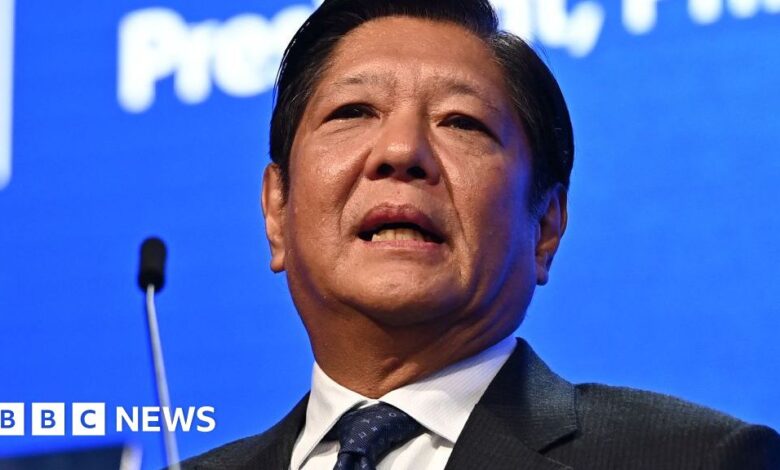Philippine President Ferdinand Marcos Jr. warns China against ‘acts of war’

Philippine President Ferdinand Marcos Jr. has warned China not to cross the red line in the South China Sea, where tensions between the countries continue to escalate.
He said on Friday that if any Filipinos were killed due to China’s intentional actions, the Philippines would consider it almost “an act of war” and would react accordingly.
Mr. Marcos spoke at a security forum in Singapore attended by defense ministers around the world, including Mr. Lloyd Austin of the United States.
He emphasized that the region remains Washington’s main focus and that the United States is only safe if Asia is too.
In recent months, the long-running dispute between China and the Philippines over territory in the South China Sea has turned into bitter clashes.
Manila has loudly complained about Chinese patrol boats firing water cannons at Philippine boats and supply ships.
Beijing claims that it is defending its sovereignty. At the summit, a Chinese military spokesman accused the Philippines of carrying out “provocative actions”.
Observers fear that any escalation could spark conflict in the South China Sea between the Chinese and Americans. The United States is bound by a treaty signed with the Philippines to defend the Southeast Asian country if it is attacked.
The US has said it will uphold its commitments to regional allies and seek to draw them closer together, including holding summits with the Philippines and Japan last month.
On Friday night, Mr. Marcos had just finished his opening speech at the Shangri-la Dialogue in Singapore when a delegate posed a hypothetical situation in which a Chinese water cannon killed a Philippine soldier. He was asked whether he considered that a red line and whether this referred to the US-Philippines treaty.
“If by an intentional act, a Filipino — not just a soldier, but even a Filipino citizen — is killed… that is what I think is very, very close to what we would define as an act of war. competition and therefore we will respond accordingly. And I believe our treaty partners hold themselves to similar standards.”
He noted that Filipinos have been injured in recent clashes but no one has died. “Once we reach that point, we will definitely cross the Rubicon. Is that the red line? That would almost certainly be a red line.”
Asked for comment by the BBC, a Chinese military spokesman said that “if just one soldier was accidentally killed in a conflict or accident that caused a war, then I truly believe it was a belligerent nation”.
He also disagreed with Mr. Marcos criticizing China’s sovereignty moves in his speech and accusing the Philippines of “blaming China”.
Hours later, US Secretary of Defense Lloyd Austin said in his speech that “the harassment facing the Philippines is dangerous – plain and simple”.
When asked how the United States would respond to the situation presented to Mr. Marcos, he said that while its commitment to the treaty with the Philippines was “steadfast,” he would not speculate on whether the United States would How can you react?
However, he said they will continue to strengthen dialogue and promote freedom of navigation at sea and in the skies. “Our goal is to make sure that we don’t allow things to get out of control unnecessarily,” he said. “In my view, a war or a war with China is not imminent or inevitable.”
Addressing a group of delegates mainly from Asia, he emphasized America’s commitment to the Indo-Pacific region, which he said remained its top priority, despite Conflicts in Ukraine and Gaza.
He listed the ways they are building up the defenses of many Asian countries through exercises, agreements and the presence of US troops. “America can only be safe if Asia is safe,” he said.
An important part of the US strategy is to strengthen the Philippines’ military. The multi-year defense roadmap with the US could see the superpower send drones, military transport aircraft and defense systems. Manila is also trying to win a large share of the military aid package proposed by the United States for its allies in the Indo-Pacific region.
The Philippines is also increasing military spending and buying missiles from India.
At the summit, China’s military said the Philippines had been “encouraged” by outside powers and had “broken promises and taken provocative actions” over the disputed Second Thomas Shoal, where Manila has establish a military outpost.
They also objected to the US sending a medium-range missile system to the Philippines during recent joint exercises, saying it “poses a real threat to regional security”.
Referring to Mr. Austin’s speech, a Chinese military spokesman said the US strategy would “create division, incite confrontation and undermine stability” in the region. It called on Southeast Asian countries to resolve disagreements with China through dialogue “instead of inviting the wolf into the house and playing with fire.”
But both the US and China have also signaled that they are interested in improving communication to avoid conflict.
After the meeting between Mr. Austin and Mr. Dong, both sides said they were working to resume phone conversations between military commanders – a vital hotline severed in 2022 after a visit to Taiwan. Loan by US House Speaker Nancy Pelosi – and establish a crisis communications working group.
“I told Mr. Dong that if he called me for an urgent matter, I would answer the phone. And I certainly hope that he will do the same,” Austin said, adding that such communication would improve stability in the region.
The Chinese military said the meeting was “positive, practical and constructive” and that US-China relations were “stabilized from further deterioration”.




